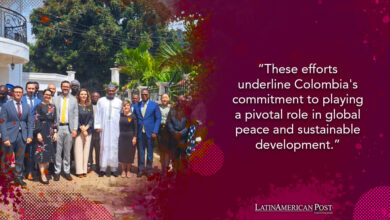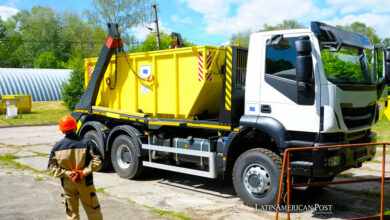Colombia’s Oil Dilemma: Curbing Illicit Fuel and Organized Crime

Colombian authorities seized over seven million gallons of crude in Norte de Santander, targeting illegal refineries fueling both the cocaine trade and unauthorized mining. This crackdown highlights Latin America’s broader challenge of combating organized crime and environmental degradation linked to illicit fuel production.
In a strategic operation that underscores the pervasive issue of illegal fuel production in Latin America, Colombian police recently confiscated millions of gallons of crude oil from clandestine refineries in Norte de Santander province. This significant seizure sheds light on the intricate web of organized crime, environmental harm, and the shadow economy that plagues not only Colombia but also its neighboring countries.
The Nexus of Crime and Illicit Fuel in Colombia
In Tibu, a municipality teetering on the Colombia-Venezuela border, authorities dismantled an illicit network that refined stolen crude into bootleg fuel, locally known as pategrillo. This operation not only highlights the issue of oil theft but also its critical role in sustaining other illegal activities, notably cocaine production and unauthorized mining operations. The greenish-hued pategrillo, derived from pilfered pipelines, is a cheap alternative to legally sourced fuels, underpinning a black market across the region.
The theft and illicit refining of crude oil is emblematic of the broader challenges Colombia and other Latin American nations face. Criminal syndicates exploit porous borders and vast rural expanses to siphon off valuable resources, funding their operations through environmental exploitation. The makeshift refineries, often hidden deep within Colombia’s dense forests, result in substantial economic losses and wreak havoc on the region’s biodiverse ecosystems.
The Regional Ramifications of Illicit Fuel Trade
The issue of illegal fuel refineries extends beyond Colombia’sColombia’s borders, touching various countries in Latin America. Venezuela, with its vast oil reserves, has also been a hotspot for fuel smuggling, exacerbating the region’s struggle with organized crime and corruption. The porous border between Colombia and Venezuela has facilitated a thriving cross-border black market in hydrocarbons, complicating efforts to clamp down on these illicit activities.
The recent operation in Norte de Santander underscores the Colombian government’s dual commitment to combating organized crime and preserving environmental integrity. Colonel William Castano’s assertion of the national police’s role in safeguarding nature highlights a growing recognition of the interconnectedness of environmental and security challenges. The seizure of makeshift refineries and storage pools marks a significant step in disrupting the supply chain of illicit fuel. Yet, it also underlines the need for sustained and coordinated efforts across the region.
The Socio-Economic Context and Impact
Beyond the immediate environmental and legal ramifications, the illicit fuel trade in Colombia and its neighbors poses significant socio-economic challenges. Rural communities, often caught in the crossfire of organized crime and state crackdowns, face dilemmas of economic survival and safety. The lure of the illicit economy can be vital in areas where legal opportunities are scarce, prompting a cycle of dependency and conflict that hampers long-term development and peace.
Addressing the complex issue of illegal fuel refineries requires comprehensive policy responses beyond mere law enforcement. Strategies must encompass economic development, community engagement, and international cooperation to dismantle the networks that drive illicit fuel trade effectively. Collaboration with neighboring countries, particularly in intelligence-sharing and border security, is crucial in stemming the cross-border flow of stolen hydrocarbons.
Future Directions and Challenges
The battle against illegal refineries in Colombia and the broader Latin American context is far from over. While seizures like those in Norte de Santander are pivotal, they represent only a part of a multifaceted approach needed to combat organized crime and its environmental impact. The region must forge a path that balances economic development, environmental preservation, and social stability, ensuring that efforts to curb the illicit fuel trade contribute to broader goals of peace and sustainability.
Also read: Colombian Coffee Industry Navigates Sustainability, Innovation, and Global Storms
The seizure in Colombia’s Norte de Santander province highlights the immediate issue of illegal fuel production and casts a spotlight on Latin America’s broader challenges. The fight against this illicit trade is intertwined with the region’s struggle against organized crime, environmental degradation, and the search for sustainable development. As Latin America grapples with these interlinked issues, pursuing comprehensive and cooperative solutions remains paramount in ensuring its people’s well-being and preserving its rich environmental heritage.





